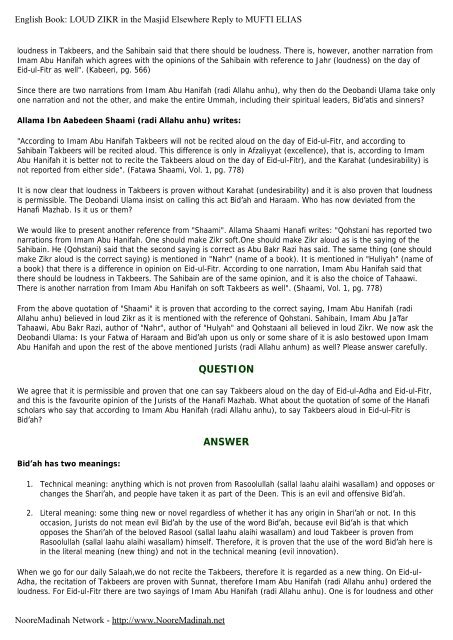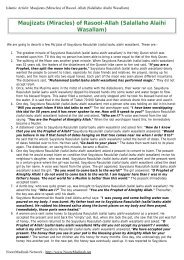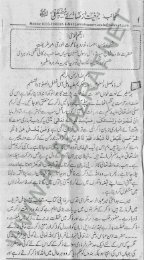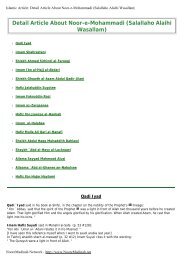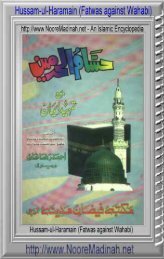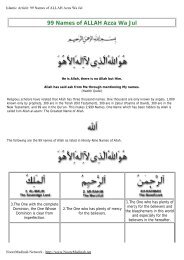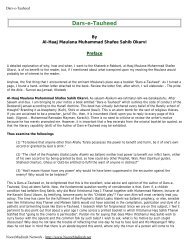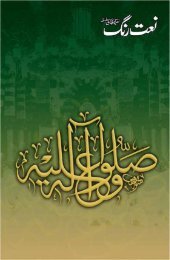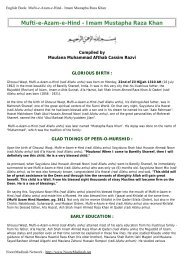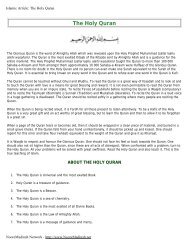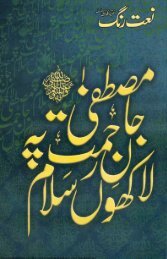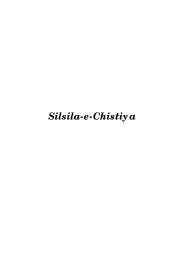LOUD ZIKR in the Masjid & Elsewhere & Reply to MUFTI ELIAS
LOUD ZIKR in the Masjid & Elsewhere & Reply to MUFTI ELIAS
LOUD ZIKR in the Masjid & Elsewhere & Reply to MUFTI ELIAS
Create successful ePaper yourself
Turn your PDF publications into a flip-book with our unique Google optimized e-Paper software.
English Book: <strong>LOUD</strong> <strong>ZIKR</strong> <strong>in</strong> <strong>the</strong> <strong>Masjid</strong> <strong>Elsewhere</strong> <strong>Reply</strong> <strong>to</strong> <strong>MUFTI</strong> <strong>ELIAS</strong><br />
loudness <strong>in</strong> Takbeers, and <strong>the</strong> Sahiba<strong>in</strong> said that <strong>the</strong>re should be loudness. There is, however, ano<strong>the</strong>r narration from<br />
Imam Abu Hanifah which agrees with <strong>the</strong> op<strong>in</strong>ions of <strong>the</strong> Sahiba<strong>in</strong> with reference <strong>to</strong> Jahr (loudness) on <strong>the</strong> day of<br />
Eid-ul-Fitr as well". (Kabeeri, pg. 566)<br />
S<strong>in</strong>ce <strong>the</strong>re are two narrations from Imam Abu Hanifah (radi Allahu anhu), why <strong>the</strong>n do <strong>the</strong> Deobandi Ulama take only<br />
one narration and not <strong>the</strong> o<strong>the</strong>r, and make <strong>the</strong> entire Ummah, <strong>in</strong>clud<strong>in</strong>g <strong>the</strong>ir spiritual leaders, Bid’atis and s<strong>in</strong>ners?<br />
Allama Ibn Aabedeen Shaami (radi Allahu anhu) writes:<br />
"Accord<strong>in</strong>g <strong>to</strong> Imam Abu Hanifah Takbeers will not be recited aloud on <strong>the</strong> day of Eid-ul-Fitr, and accord<strong>in</strong>g <strong>to</strong><br />
Sahiba<strong>in</strong> Takbeers will be recited aloud. This difference is only <strong>in</strong> Afzaliyyat (excellence), that is, accord<strong>in</strong>g <strong>to</strong> Imam<br />
Abu Hanifah it is better not <strong>to</strong> recite <strong>the</strong> Takbeers aloud on <strong>the</strong> day of Eid-ul-Fitr), and <strong>the</strong> Karahat (undesirability) is<br />
not reported from ei<strong>the</strong>r side". (Fatawa Shaami, Vol. 1, pg. 778)<br />
It is now clear that loudness <strong>in</strong> Takbeers is proven without Karahat (undesirability) and it is also proven that loudness<br />
is permissible. The Deobandi Ulama <strong>in</strong>sist on call<strong>in</strong>g this act Bid’ah and Haraam. Who has now deviated from <strong>the</strong><br />
Hanafi Mazhab. Is it us or <strong>the</strong>m?<br />
We would like <strong>to</strong> present ano<strong>the</strong>r reference from "Shaami". Allama Shaami Hanafi writes: "Qohstani has reported two<br />
narrations from Imam Abu Hanifah. One should make Zikr soft.One should make Zikr aloud as is <strong>the</strong> say<strong>in</strong>g of <strong>the</strong><br />
Sahiba<strong>in</strong>. He (Qohstani) said that <strong>the</strong> second say<strong>in</strong>g is correct as Abu Bakr Razi has said. The same th<strong>in</strong>g (one should<br />
make Zikr aloud is <strong>the</strong> correct say<strong>in</strong>g) is mentioned <strong>in</strong> "Nahr" (name of a book). It is mentioned <strong>in</strong> "Huliyah" (name of<br />
a book) that <strong>the</strong>re is a difference <strong>in</strong> op<strong>in</strong>ion on Eid-ul-Fitr. Accord<strong>in</strong>g <strong>to</strong> one narration, Imam Abu Hanifah said that<br />
<strong>the</strong>re should be loudness <strong>in</strong> Takbeers. The Sahiba<strong>in</strong> are of <strong>the</strong> same op<strong>in</strong>ion, and it is also <strong>the</strong> choice of Tahaawi.<br />
There is ano<strong>the</strong>r narration from Imam Abu Hanifah on soft Takbeers as well". (Shaami, Vol. 1, pg. 778)<br />
From <strong>the</strong> above quotation of "Shaami" it is proven that accord<strong>in</strong>g <strong>to</strong> <strong>the</strong> correct say<strong>in</strong>g, Imam Abu Hanifah (radi<br />
Allahu anhu) believed <strong>in</strong> loud Zikr as it is mentioned with <strong>the</strong> reference of Qohstani. Sahiba<strong>in</strong>, Imam Abu Ja’far<br />
Tahaawi, Abu Bakr Razi, author of "Nahr", author of "Hulyah" and Qohstaani all believed <strong>in</strong> loud Zikr. We now ask <strong>the</strong><br />
Deobandi Ulama: Is your Fatwa of Haraam and Bid’ah upon us only or some share of it is aslo bes<strong>to</strong>wed upon Imam<br />
Abu Hanifah and upon <strong>the</strong> rest of <strong>the</strong> above mentioned Jurists (radi Allahu anhum) as well? Please answer carefully.<br />
QUESTION<br />
We agree that it is permissible and proven that one can say Takbeers aloud on <strong>the</strong> day of Eid-ul-Adha and Eid-ul-Fitr,<br />
and this is <strong>the</strong> favourite op<strong>in</strong>ion of <strong>the</strong> Jurists of <strong>the</strong> Hanafi Mazhab. What about <strong>the</strong> quotation of some of <strong>the</strong> Hanafi<br />
scholars who say that accord<strong>in</strong>g <strong>to</strong> Imam Abu Hanifah (radi Allahu anhu), <strong>to</strong> say Takbeers aloud <strong>in</strong> Eid-ul-Fitr is<br />
Bid’ah?<br />
Bid’ah has two mean<strong>in</strong>gs:<br />
ANSWER<br />
1. Technical mean<strong>in</strong>g: anyth<strong>in</strong>g which is not proven from Rasoolullah (sallal laahu alaihi wasallam) and opposes or<br />
changes <strong>the</strong> Shari’ah, and people have taken it as part of <strong>the</strong> Deen. This is an evil and offensive Bid’ah.<br />
2. Literal mean<strong>in</strong>g: some th<strong>in</strong>g new or novel regardless of whe<strong>the</strong>r it has any orig<strong>in</strong> <strong>in</strong> Shari’ah or not. In this<br />
occasion, Jurists do not mean evil Bid’ah by <strong>the</strong> use of <strong>the</strong> word Bid’ah, because evil Bid’ah is that which<br />
opposes <strong>the</strong> Shari’ah of <strong>the</strong> beloved Rasool (sallal laahu alaihi wasallam) and loud Takbeer is proven from<br />
Rasoolullah (sallal laahu alaihi wasallam) himself. Therefore, it is proven that <strong>the</strong> use of <strong>the</strong> word Bid’ah here is<br />
<strong>in</strong> <strong>the</strong> literal mean<strong>in</strong>g (new th<strong>in</strong>g) and not <strong>in</strong> <strong>the</strong> technical mean<strong>in</strong>g (evil <strong>in</strong>novation).<br />
When we go for our daily Salaah,we do not recite <strong>the</strong> Takbeers, <strong>the</strong>refore it is regarded as a new th<strong>in</strong>g. On Eid-ul-<br />
Adha, <strong>the</strong> recitation of Takbeers are proven with Sunnat, <strong>the</strong>refore Imam Abu Hanifah (radi Allahu anhu) ordered <strong>the</strong><br />
loudness. For Eid-ul-Fitr <strong>the</strong>re are two say<strong>in</strong>gs of Imam Abu Hanifah (radi Allahu anhu). One is for loudness and o<strong>the</strong>r<br />
NooreMad<strong>in</strong>ah Network - http://www.NooreMad<strong>in</strong>ah.net


